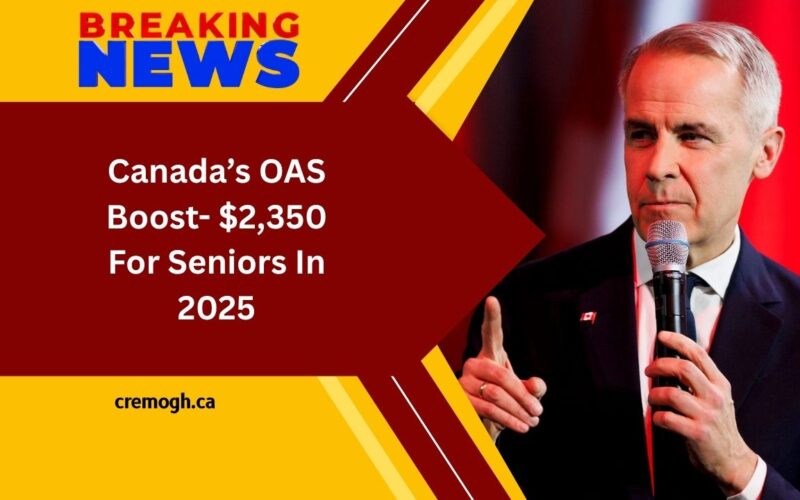The Old Age Security (OAS) program is one of Canada’s key social programs, providing monthly payments to seniors who meet specific age and residency criteria.
As of 2025, the Canadian government is considering a $2,350 one-time increase in OAS payments for eligible seniors.
This initiative could help seniors cope with the increasing cost of living, including rising food prices and healthcare costs.
What is OAS?
OAS is a monthly pension available to Canadian seniors aged 65 or older. Unlike the Canada Pension Plan (CPP), which is based on employment history, Old Age Security is funded through general tax revenue and is available to anyone who meets the age and residency requirements.
Seniors who have lived in Canada for at least 10 years qualify for partial benefits, and those who have lived in the country for at least 40 years qualify for full benefits.
$2,350 OAS Increase Details
If approved, the $2,350 one-time increase could be a major financial boost for seniors, especially those living on fixed incomes.
This payment is aimed at helping seniors manage the inflationary pressures they face, particularly in the areas of food, healthcare, and other essential services.
| Program Name | Proposed Increase | Eligibility | Monthly OAS Payments (2025) |
|---|---|---|---|
| Old Age Security (OAS) | Up to $2,350 (one-time) | Seniors aged 65+, meeting residency and income criteria | $727.67 (ages 65–74), $800.44 (ages 75+) |
Regular OAS Payments in 2025
In addition to the one-time increase, Old Age Security payments in 2025 will continue as follows:
- Seniors aged 65–74 will receive a monthly maximum of $727.67.
- Seniors aged 75 and older will receive a higher monthly payment of $800.44, thanks to a 10% boost that was introduced in 2022.
These payments are adjusted every quarter to account for inflation, ensuring that seniors’ purchasing power is protected over time.
Who Qualifies for the $2,350 Increase?
To qualify for the $2,350 one-time increase in Old Age Security, seniors must meet the following criteria:
Age:
- Must be 65 years or older in 2025.
Residency:
- Applicants must be Canadian citizens or legal residents. This also includes Canadians living abroad, as long as they meet the residency requirements or have a valid treaty with Canada.
Income:
- To receive the full Old Age Security amount, your income must fall below the recovery tax threshold (OAS clawback).
For 2025, the income thresholds before the clawback kicks in are as follows:
| Age Group | Max Annual Income Before Clawback |
|---|---|
| 65–74 years | $148,451 |
| 75+ years | $154,196 |
If your income exceeds these thresholds, Old Age Security payments will be reduced through a recovery tax, though you may still qualify for partial payments.
How to Apply for OAS
If you haven’t already started receiving OAS payments, here’s how to apply:
- Check Eligibility: Ensure you meet the age, residency, and income criteria.
- Gather Documents: Have your SIN, proof of status, and banking details ready.
- Submit Application: You can apply online through your My Service Canada Account, or submit a paper application by mail.
- Track Status: After applying, you can track your application status online or call Service Canada for updates.
It’s essential to apply early to avoid any delays, as processing times can vary, and it might take a few weeks before you start receiving payments.
OAS Payment Dates
OAS payments are issued on a monthly basis, usually on the third-last business day of each month. Here are the expected Old Age Security payment dates for 2025:
| Month | OAS Payment Date |
|---|---|
| April | April 29, 2025 |
| May | May 27, 2025 |
| June | June 28, 2025 |
If the $2,350 increase is approved, expect a separate mid-year payment around mid-2025.
How to Maximize OAS Benefits
Here are some tips on maximizing your OAS benefits:
- Defer Your Old Age Security Payments: If you can afford to wait, you can defer your OAS payments up to 5 years. For every month you wait, you will receive a 0.6% increase—a potential 36% boost by age 70.
- Minimize OAS Clawback: To keep more of your Old Age Security, consider:
- Using a Tax-Free Savings Account (TFSA) since withdrawals from it are not counted as income.
- Withdrawing from RRSPs in low-income years to avoid high-income years that might trigger the Old Age Security clawback.
- Splitting pension income with a lower-income spouse.
- Apply for Extra Help: If your income is low, you may qualify for the Guaranteed Income Supplement (GIS), which provides additional funds on top of Old Age Security.
Also, check your provincial benefits for things like drug plans, housing support, or heating rebates.
The $2,350 increase in Old Age Security payments, if approved, will be a significant help for qualifying seniors struggling with the high costs of living.
To maximize the benefit, it’s essential to apply early, stay informed about payment dates, and take advantage of the strategies mentioned.
FAQs
Who qualifies for the $2,350 Old Age Security increase?
To qualify, you must be 65 or older, a Canadian resident (or meet residency requirements), and have income below the clawback thresholds.
When will the $2,350 OAS increase be paid?
The increase is expected in mid-2025 as a separate one-time payment for qualifying seniors.
Can I apply for OAS if I live abroad?
Yes, Canadians living abroad can still apply for OAS, as long as they meet the minimum residency or treaty requirements.




